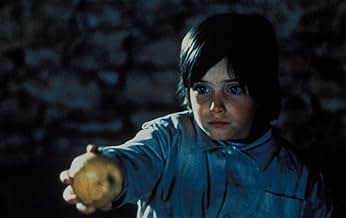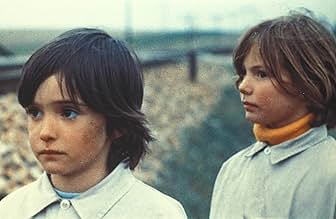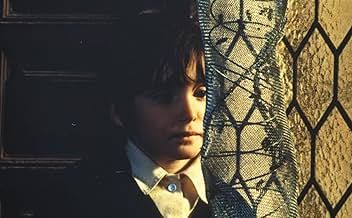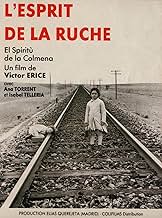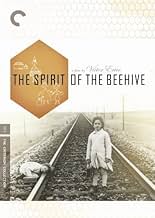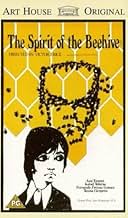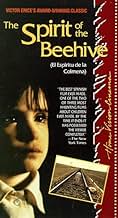Spanien 1940: Durch den Film Frankenstein traumatisiert, taucht ein sensibles siebenjähriges Mädchen aus einem kleinen Dorf in ihre eigene Fantasiewelt ein.Spanien 1940: Durch den Film Frankenstein traumatisiert, taucht ein sensibles siebenjähriges Mädchen aus einem kleinen Dorf in ihre eigene Fantasiewelt ein.Spanien 1940: Durch den Film Frankenstein traumatisiert, taucht ein sensibles siebenjähriges Mädchen aus einem kleinen Dorf in ihre eigene Fantasiewelt ein.
- Regie
- Drehbuch
- Hauptbesetzung
- Auszeichnungen
- 7 Gewinne & 1 Nominierung insgesamt
Empfohlene Bewertungen
Without using much dialogue in the movie, Erice artistically comments on the political tension in Spain through potent images and scenes. He uses symbols such as the two young sisters to represent the division between the Republican and Nationalist parties, and the leitmotif of the beehive to represent the "trapped" workers in Spain under Franco. The most amazing aspect is that all of the post-war commentary is said without any words and without mentioning the actual event! It is a "cine de espectáculo," or spectacle cinema, that symbolizes the connection between fantasy in the movies and fantasy in reality. Without knowing the history of Spain, a spectator could misinterpret the movie as a commentary about the imagination of a little girl after viewing the movie "Frankenstein." The character of Frankenstein is a main component contributing to Ana's, the younger sister, interpretation of reality in Spain, and it gains meaning as Frankenstein evolves from a character in the movie to an object of fantasy. It continues to evolve into a man of flesh and bones and finally represents the hope of Ana when all other sources of information in her life turn out to be faulty.
"El espíritu de la colmena" is a powerful movie that uses many metaphors (such as Ana for the young, innocent generation of Spain) to question the interpretation of reality. It is a powerful, artistically made movie that captivates the viewer through images rather than words. It should be seen more than once in order to understand all it's hidden messages.
Many people here have mentioned the historical metaphors within the film but I won't delve into that, I thought the story was completely about the main character Ana.
First off, the actress who played Ana was very authentic, with a striking face full of emotion. She genuinely believed a lot of what was happening in the film including the Frankenstein monster being real! Such authenticity means it's worth seeing it for that alone and that is where the films true beauty lies...
For all this though, for what is essentially a beautifully shot film with great cinematography and performances, the film was a bit dull! It was only after the first 45 minutes or so that I started to wake up. There was a whole sub-plot between the parents marriage which I felt added little weight to the rest of the story.. There just wasn't a whole lot I felt I hadn't seen before.
So for me, I can see the film for what it was worth and why it received such accolades. But it was a little too dull for me to consider it "Great"
I recall one of my absolute favourite films ever The Fall, which also included a little girl who believed so much of the movie around her, that film was gripping from start to finish and never dull for a moment. Strange it hasn't gotten the praise it so deserved..
Wusstest du schon
- WissenswertesCinematographer Luis Cuadrado was going blind at the time this film was made. An assistant would take Polaroids of the scenes and Cuadrado would direct the lighting by looking through a magnifying glass at these pictures. In 1980 Cuadrado committed suicide after he went completely blind and the tumor in his brain became too painful to face.
- PatzerWhen the fugitive jumps from the train and rolls down the hill, he's wearing boots, but in the next shot he's wearing low-cut shoes.
- Zitate
Ana: [unable to sleep] Isabel?
Isabel: [opening her eyes] What?
Ana: [whispering] Tell me what you were going to tell me.
Isabel: [whispering] About what?
Ana: The movie.
Isabel: Not now... Tomorrow.
Ana: Now... You promised. Why did he kill the girl, and why did they kill him after that?... You don't know - you're a liar.
Isabel: They didn't kill him, and he didn't kill the girl.
Ana: How do you know? How do you know they didn't die?
Isabel: Everything in the movies is fake. It's all a trick. Besides, I've seen him alive.
Ana: Where?
Isabel: In a place I know near the village. People can't see him. He only comes out at night.
Ana: Is he a ghost?
Isabel: No, he's a spirit.
Isabel: Like the spirit Dona Lucia talks about?
Isabel: Yes, but spirits have no bodies. That's why you can't kill them.
Ana: But he had one in the movie. He had arms and feet. He had everything.
Isabel: It's a disguise they put on when they go outside...
Ana: If he only comes out at night, how can you talk to him?
Isabel: I told you he was a spirit. If you're his friend, you can talk to him whenever you want. Just close your eyes and call him... It's me, Ana... It's me Ana...
[they hear what sounds like ominous footsteps and are silent]
- VerbindungenFeatured in Sus años dorados (1980)
- SoundtracksOjos verdes
Written by Salvador Valverde (as Valverde), Rafael de León (as León) y Manuel L. Quiroga (as Quiroga)
Top-Auswahl
Details
- Erscheinungsdatum
- Herkunftsland
- Offizieller Standort
- Sprache
- Auch bekannt als
- The Spirit of the Beehive
- Drehorte
- Hoyuelos, Segovia, Castilla y León, Spanien(Town and exteriors)
- Produktionsfirmen
- Weitere beteiligte Unternehmen bei IMDbPro anzeigen
Box Office
- Weltweiter Bruttoertrag
- 190.734 $
- Laufzeit1 Stunde 38 Minuten
- Sound-Mix
- Seitenverhältnis
- 1.66 : 1
Zu dieser Seite beitragen


![Tráiler [OV] ansehen](https://m.media-amazon.com/images/M/MV5BZDcyMjExODEtZGJlYy00MGNmLWJhZTItNzQ5MTNjNzAzNDQ2XkEyXkFqcGdeQXRyYW5zY29kZS13b3JrZmxvdw@@._V1_QL75_UX500_CR0)
